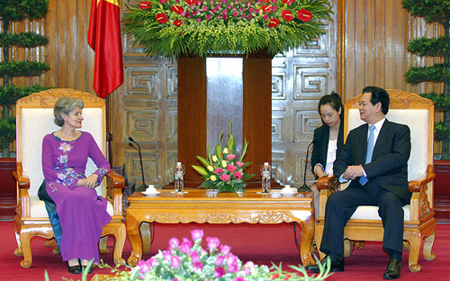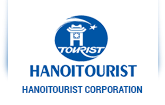Viet Nam: Prime Minister Advocates Deeper Cooperation with UNESCO for Sustainable Development
 (Hanoitourist) - Prime Minister Mr Nguyen Tan Dung expressed strong appreciation for UNESCO’s cooperation with Viet Nam and underscored the value of human resource development through education and the protection and promotion of cultural heritage to achieve sustainability, during a meeting with the Director-General in Hanoi on 20 June.
(Hanoitourist) - Prime Minister Mr Nguyen Tan Dung expressed strong appreciation for UNESCO’s cooperation with Viet Nam and underscored the value of human resource development through education and the protection and promotion of cultural heritage to achieve sustainability, during a meeting with the Director-General in Hanoi on 20 June.
“We highly appreciate the outcomes and role played by UNESCO in Viet Nam,” said the Prime Minister, referring to the Memorandum of Understanding signed with the country in 2010, which has led to significant nationwide progress in all the Organization’s fields of competence.
The Director-General commended Viet Nam for its impressive economic growth and development achievements over the last years, noting that it was also struggling with such challenges as climate change.
“You have the ambition to achieve quality education for all and to draw on the values of your cultural heritage to promote social inclusion and sustainable development. This embodies UNESCO’s mandate, and we want to accompany Viet Nam in this highly justified mission through capacity building and sharing expertise.”
To this end, she invited the Prime Minister to consider establishing a self-benefiting funds-in-trust in order to deepen cooperation in education, cultural heritage protection and other areas of need -- citing the examples of other ASEAN countries that have favoured this model.
The Prime Minister welcomed the proposal and placed central emphasis on the enabling role of culture: “Viet Nam’s history goes back thousands of years. We attach great importance to cultural values as a foundation for the spiritual life of our people. We give special attention to preserving and protecting our tangible and intangible heritage, so that it contributes to sustainable development.”
The Director-General reviewed the scope of UNESCO’s cooperation with Viet Nam during an extensive meeting with the Vice Minster of Foreign Affairs and Chairman of the National Commission Mr Nguyen Thanh Son, who was accompanied by a delegation representing all areas of UNESCO’s mandate, from hydrology to education and heritage.
In education, Mr Son emphasized Viet Nam’s interest in the follow-up to the Decade of Education for Sustainable Development, including in the context of the post-2015 agenda, and called for further support to improve education quality, sexuality education, literacy and lifelong learning.
Turning to science, he highlighted initiatives to raise community awareness of climate change and to improve the livelihoods communities living near biosphere reserves, and called for assistance to better manage biosphere reserves.
To address the challenges of the country’s rapid development, he emphasized the need for expertise on social transformations.
Highlighting efforts to improve the capacity of staff to manage heritage sustainably, he requested continued technical assistance for safeguarding tangible and intangible heritage, and preparing nomination dossiers.
“Viet Nam is a developing country concerned by economic development,” said Mr Son, “but preserving heritage is no less important. We are determined to continue along this path.”
Finally, he expressed interest in supporting journalism training, and expanding communications activities in remote rural areas.
“I think UNESCO can contribute enormously in areas where Viet Nam is looking for solutions: capacity building, inclusiveness, education quality, science, technology and innovation, and linking culture to sustainable development, because Viet Nam is an excellent example of how culture can build social justice, create jobs and promote social inclusion,” said the Director-General.
In a separate meeting, the Minister of Education and Training, Mr Pham Vu Luan, expressed appreciation for UNESCO’s support to the country’s comprehensive and fundamental reform, aimed at improving educational access and quality, and building a “flexible and sustainable learning society.”
He indicated that disadvantaged and vulnerable children, including a large number of disabled, were at the heart of the Government’s education policy.
Noting that children were highly vulnerable to climate change, he commended the cooperation underway between his Ministry, UNESCO and Samsung, in the area of disaster risk reduction. He stressed the need to share best practices in ICTs for education, sexuality education and gender-sensitive learning environments, stating that UNESCO and Viet Nam have become “like members of one family.”
The Director-General assured the Minister of UNESCO’s support, noting that Viet Nam’s strong national ownership and vision were the key to achieving good results.
“There are strong synergies between your vision of the future and our role as a global advocate for education, as we have always said that education is the best investment a country can make to overcome poverty, achieve social cohesion, social mobility and tackle problems of inequality.”
In her meetings with the Prime Minister and senior Government officials, the Director-General commended Viet Nam’s leadership in ASEAN – the country currently holds the Office of the Secretary-General – and expressed strong hope that that a new ASEAN-UNESCO Framework for Cooperation would be signed at the next session of UNESCO’s General Conference, to contribute to the region’s socio-cultural integration and development./.
Source: UNESCO










 Share:
Share:




